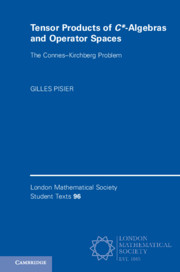Book contents
- Frontmatter
- Contents
- Introduction
- 1 Completely bounded and completely positive maps
- 2 Completely bounded and completely positive maps
- 3 C*-algebras of discrete groups
- 4 C*-tensor products
- 5 Multiplicative domains of c.p. maps
- 6 Decomposable maps
- 7 Tensorizing maps and functorial properties
- 8 Biduals, injective von Neumann algebras, and C*-norms
- 9 Nuclear pairs, WEP, LLP, QWEP
- 10 Exactness and nuclearity
- 11 Traces and ultraproducts
- 12 The Connes embedding problem
- 13 Kirchberg’s conjecture
- 14 Equivalence of the two main questions
- 15 Equivalence with finite representability conjecture
- 16 Equivalence with Tsirelson’s problem
- 17 Property (T) and residually finite groups
- 18 The WEP does not imply the LLP
- 19 Other proofs that C(n)
- 20
Local embeddability into C and nonseparability of (OSn, dcb)- 21
WEP as an extension property- 22
Complex interpolation and maximal tensor product- 23
Haagerup’s characterizations of the WEP- 24
Full crossed products and failure of WEP for B ⊗min B- 25
Open problems- Appendix
Miscellaneous backgroundReferencesIndex - 20
10 - Exactness and nuclearity
Published online by Cambridge University Press: 10 February 2020
- Frontmatter
- Contents
- Introduction
- 1 Completely bounded and completely positive maps
- 2 Completely bounded and completely positive maps
- 3 C*-algebras of discrete groups
- 4 C*-tensor products
- 5 Multiplicative domains of c.p. maps
- 6 Decomposable maps
- 7 Tensorizing maps and functorial properties
- 8 Biduals, injective von Neumann algebras, and C*-norms
- 9 Nuclear pairs, WEP, LLP, QWEP
- 10 Exactness and nuclearity
- 11 Traces and ultraproducts
- 12 The Connes embedding problem
- 13 Kirchberg’s conjecture
- 14 Equivalence of the two main questions
- 15 Equivalence with finite representability conjecture
- 16 Equivalence with Tsirelson’s problem
- 17 Property (T) and residually finite groups
- 18 The WEP does not imply the LLP
- 19 Other proofs that C(n)
- 20 Local embeddability into C and nonseparability of (OSn, dcb)
- 21 WEP as an extension property
- 22 Complex interpolation and maximal tensor product
- 23 Haagerup’s characterizations of the WEP
- 24 Full crossed products and failure of WEP for B ⊗min B
- 25 Open problems
- Appendix Miscellaneous background
- References
- Index
Summary
We prove Kirchberg's theorem asserting that the fundamental pair (B,C) is nuclear where B is the algebra B of bounded operators on Hilbert space and C isthe full group C*-algebraof the free group with countably infinitely many generators. We then say that aC*-algebra A has the WEP (resp. LLP)if the pair (A,C) (resp. (A,B)) is nuclear. The generalized form of Kirchberg's theorem is then that any pair formed of a C*-algebra with the WEP and one with the LLP is nuclear. We show that the WEP of a C*-algebra A is equivalent to a certain extension property for maps on A with values in a von Neumann algebra, from which the term weak expectation is derived. In turn the LLP of A is equivalent to a certain local lifting property for maps on A with values in a quotient C*-algebra. We introduce the class of C*-algebras, called QWEP, that are quotients of C*-algebras with the WEP. One can also define analogues of the WEP and the LLP for linear maps between C*-algebras. Several properties can be generalized to this more general setting.
Information
- Type
- Chapter
- Information
- Tensor Products of C*-Algebras and Operator SpacesThe Connes–Kirchberg Problem, pp. 210 - 224Publisher: Cambridge University PressPrint publication year: 2020
Accessibility standard: Unknown
Why this information is here
This section outlines the accessibility features of this content - including support for screen readers, full keyboard navigation and high-contrast display options. This may not be relevant for you.Accessibility Information
Save book to Kindle
To save this book to your Kindle, first ensure no-reply@cambridge.org is added to your Approved Personal Document E-mail List under your Personal Document Settings on the Manage Your Content and Devices page of your Amazon account. Then enter the ‘name’ part of your Kindle email address below. Find out more about saving to your Kindle.
Note you can select to save to either the @free.kindle.com or @kindle.com variations. ‘@free.kindle.com’ emails are free but can only be saved to your device when it is connected to wi-fi. ‘@kindle.com’ emails can be delivered even when you are not connected to wi-fi, but note that service fees apply.
Find out more about the Kindle Personal Document Service.
- Exactness and nuclearity
- Book: Tensor Products of <I>C</I>*-Algebras and Operator Spaces
- Online publication: 10 February 2020
Save book to Dropbox
To save content items to your account, please confirm that you agree to abide by our usage policies. If this is the first time you use this feature, you will be asked to authorise Cambridge Core to connect with your account. Find out more about saving content to Dropbox.
- Exactness and nuclearity
- Book: Tensor Products of <I>C</I>*-Algebras and Operator Spaces
- Online publication: 10 February 2020
Save book to Google Drive
To save content items to your account, please confirm that you agree to abide by our usage policies. If this is the first time you use this feature, you will be asked to authorise Cambridge Core to connect with your account. Find out more about saving content to Google Drive.
- Exactness and nuclearity
- Book: Tensor Products of <I>C</I>*-Algebras and Operator Spaces
- Online publication: 10 February 2020
